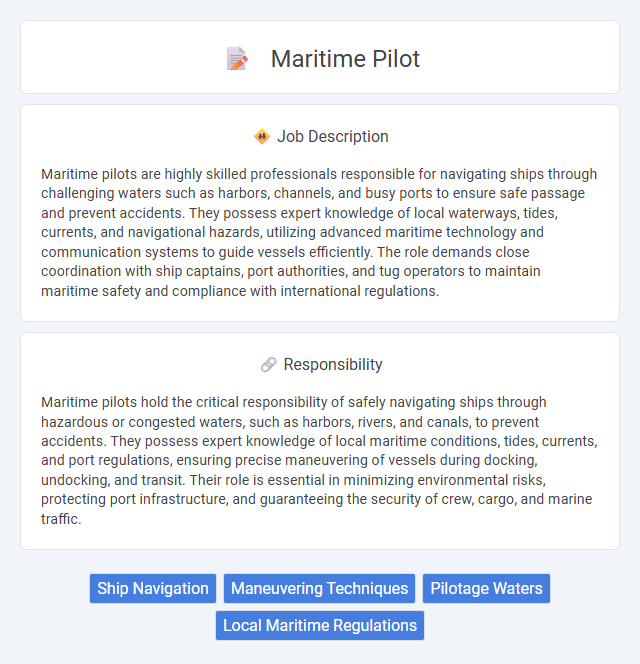
Maritime pilots are highly skilled professionals responsible for navigating ships through challenging waters such as harbors, channels, and busy ports to ensure safe passage and prevent accidents. They possess expert knowledge of local waterways, tides, currents, and navigational hazards, utilizing advanced maritime technology and communication systems to guide vessels efficiently. The role demands close coordination with ship captains, port authorities, and tug operators to maintain maritime safety and compliance with international regulations.
Maritime pilots will likely thrive in this job if they possess strong decision-making skills, excellent spatial awareness, and the ability to remain calm under pressure. Individuals prone to anxiety or with difficulty handling high-stress situations might find the demands of steering large vessels in tight waterways challenging. Those with a passion for navigation and seasoned experience at sea will probably find this role rewarding and well-suited to their capabilities.
Qualification
Maritime pilots require specialized training, including completing a certified maritime academy program and accumulating extensive sea service hours to gain practical experience in vessel navigation. Licensing mandates passing rigorous exams on local waterways, ship handling, and maritime regulations specific to the operating region. Continuous education and physical fitness assessments are essential to maintain certification and ensure safe navigation through challenging port environments.
Responsibility
Maritime pilots hold the critical responsibility of safely navigating ships through hazardous or congested waters, such as harbors, rivers, and canals, to prevent accidents. They possess expert knowledge of local maritime conditions, tides, currents, and port regulations, ensuring precise maneuvering of vessels during docking, undocking, and transit. Their role is essential in minimizing environmental risks, protecting port infrastructure, and guaranteeing the security of crew, cargo, and marine traffic.
Benefit
Maritime pilots likely enjoy significant benefits such as high salary potential and job stability due to the specialized nature of their skills. This profession may offer opportunities for extensive travel and diverse working environments, appealing to those seeking adventure at sea. Health and retirement benefits are often part of the compensation package, reflecting the demanding and critical nature of their work.
Challenge
The maritime pilot job likely presents significant challenges due to the need to navigate complex waterways under varying weather and traffic conditions. Pilots probably face high responsibility, requiring precise decision-making to ensure the safety of vessels and crews. The role may also involve constant adaptation to evolving regulations and technological advancements in maritime navigation.
Career Advancement
Maritime pilots gain expertise in maneuvering large vessels through challenging waterways, providing a critical skill set that lays a foundation for career advancement into senior roles such as chief pilot or harbor master. With experience, pilots often transition into maritime consultancy, port management, or training positions, leveraging their knowledge of navigation, safety regulations, and ship handling. Continuous professional development and certifications, including advanced maritime safety and leadership courses, are essential to unlocking higher responsibilities and leadership opportunities within the maritime industry.
Key Terms
Ship Navigation
Maritime pilots specialize in ship navigation by expertly maneuvering vessels through challenging coastal waters, ports, and harbors to ensure safe docking and departure. Their deep knowledge of local tides, currents, and underwater obstacles minimizes the risk of collisions and groundings. Skilled in interpreting navigational charts and employing advanced radar and GPS technologies, maritime pilots play a critical role in maintaining maritime safety and operational efficiency.
Maneuvering Techniques
Maritime pilots specialize in advanced maneuvering techniques to safely guide vessels through challenging waterways, ports, and harbors. Their expertise in ship handling, including precise control of speed, rudder, and thrusters, ensures the prevention of groundings and collisions in confined or congested areas. Mastery of tidal currents, wind effects, and vessel dynamics is critical for executing complex maneuvers during docking and undocking operations.
Pilotage Waters
Maritime pilots navigate vessels through complex and congested pilotage waters, ensuring safe passage by leveraging detailed knowledge of local tides, currents, and underwater hazards. They operate primarily in ports, harbors, and coastal waterways where precise maneuvering is critical to prevent accidents and environmental damage. Expertise in pilotage waters directly contributes to efficient vessel traffic management and maritime safety.
Local Maritime Regulations
Maritime pilots must possess comprehensive knowledge of local maritime regulations to ensure safe navigation within port limits. These regulations include specific rules on vessel traffic management, berthing procedures, environmental protections, and emergency protocols tailored to the region. Compliance with local laws minimizes risks of accidents and environmental damage while facilitating efficient port operations.
 kuljobs.com
kuljobs.com